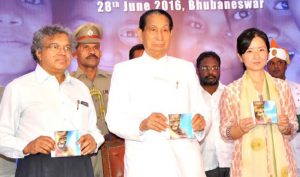 The Governor of Odisha, Dr S.C. Jamir today released UNICEF’s annual flagship report ‘The State of the World’s Children 2016’ report in Odisha. The report this year focuses attention on the issue of Equity: ‘A Fair Chance for Every Child.’
The Governor of Odisha, Dr S.C. Jamir today released UNICEF’s annual flagship report ‘The State of the World’s Children 2016’ report in Odisha. The report this year focuses attention on the issue of Equity: ‘A Fair Chance for Every Child.’
The report notes that significant progress has been made the past decades in saving children’s lives, getting children into school and lifting people out of poverty. But this progress has been neither even nor fair. Millions of children’s lives are destroyed, for no other reason than the circumstances into which they are born – country, the community, the gender and poverty.
The poorest children are twice as likely to die before their fifth birthday and to be chronically malnourished than the richest. Across much of South Asia and sub-Saharan Africa, children born to mothers with no education are almost 3 times more likely to die before they are 5 than those born to mothers with a secondary education. And girls from the poorest households are 2.5 more likely to marry as children than girls from the wealthiest households.
Quality education has the power to end intergenerational cycles of inequity, improving the lives of children and the societies in which they live, but progress in expanding access and improving quality has stalled. The number of children who do not attend school has increased, and a significant proportion of those who do go to school are not learning. Globally about 124 million children today do not go to primary- and lower-secondary school, and almost 2 in 5 who do finish primary school have not learned how to read, write or do simple arithmetic.
On average, each additional year of education a child receives increases his or her adult earnings by about 10 percent. And for each additional year of schooling completed, on average, by young adults in a country, that country’s poverty rates fall by 9 per cent. Inequity is neither inevitable, nor insurmountable, the report argues.
